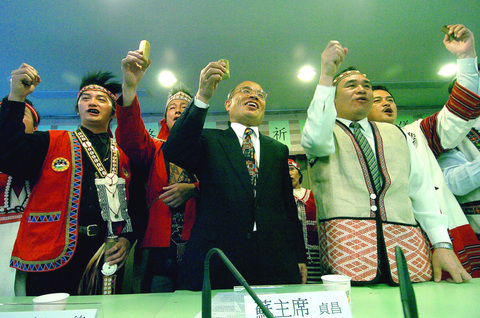In an effort to highlight the importance it attaches to Aboriginals, the Democratic Progressive Party (DPP) nominated seven Aboriginal candidates for the National Assembly elections on May 14.
The selection of Aboriginal candidates to be included in the DPP's list of 150 nominees for the National Assembly elections represents the party's respect for the group by including them in the constitutional amendment process, DPP officials said.
"Aboriginal peoples are the original inhabitants of Taiwan," said DPP Chairman Su Tseng-chang (蘇貞昌), after introducing the seven Aboriginal candidates last week. "They should enjoy the right to participate in constitutional amendments."

PHOTO: SEAN CHAO, TAIPEI TIMES
In a blessing ceremony held by the party last week, leaders and respected elders from the Paiwan, Amis, Saisyat, Tsou and Atayal tribes wore traditional clothes and performed tribal ceremonies to bless the Aboriginal candidates from each tribe.
Speaking at the event, Mayaw Kumu, Deputy Director of the DPP's Ethnic Affairs Department, said that the party wants to include the voice of Aboriginals in the decision-making process of constitutional revision.
The selection of Aboriginals also honored the New Partnership Treaty Between the Indigenous Peoples and Government of Taiwan, a document President Chen Shui-bian (陳水扁) signed to promote Aboriginal autonomy, Mayaw said.
"The seven Aboriginal representatives will take the opportunity to press for the establishment of an `Aboriginal clause' in the Constitution to ensure that Aboriginal peoples' treaty rights will be protected," Mayaw said.
Comparing the party's recommendation list to that of the Chinese Nationalist Party's (KMT), which nominated five Aboriginal candidates, Mayaw said that the DPP is giving a chance to younger Aboriginals to represent the younger generation.
"Participating in constitutional reform provides the younger generation with a great chance to understand more about national policies and the way politics work," he said.
"More importantly, the sprit of Aboriginal political movements can hopefully be handed to the next generation as they take part in the country's evolution and strive for Aboriginal rights in constitutional reform," Mayaw said.
The seven candidates are: Former presidential advisor Antonio Hong (鴻義章) of the Amis tribe; president of Yushan Theological College & Seminary Pusing Tali (高萬金) of the Atayal tribe; Voyu Yakumangana of the Tsou tribe and executive director of the Association for Taiwan Indigenous People's Policies; Liglove Awu of the Paiwan tribe and executive director of Millet Foundation; Icyang Parod of the Amis tribe and Chief of Aboriginal Affairs under the Taipei County Government; Dahurshi, who is general director of Saisyat Tribe Culture Development Association; and Tsong (曾智勇) of the Paiwan tribe and chief of Aboriginal Affairs under Pingtung County Government. Six of the seven candidates are male, and all are in their 30s or 40s.
Most of them have been selected from the Aboriginal rights, cultural, religious and political fields.
"I think the most important issue the Aboriginal candidates need to address is the establishment of the `Aboriginal Chapter' in the Constitution," said Liglove, the only female nominee among the group.
Voyu, who has been devoted to Aboriginal rights since college, agreed that including Aboriginal rights in the Constitution is the primary goal for Aboriginal candidates.
"The Aboriginal Chapter will address important issues such as the setup of an autonomous region for Aboriginals, resource allocation and land ownership," Voyu said.
"In addition to Aboriginal rights, I think participating in constitutional reform will raise the political status of the Aboriginal people and give us sort of a formal recognition by the country," Voyu said.

Nipah virus infection is to be officially listed as a category 5 notifiable infectious disease in Taiwan in March, while clinical treatment guidelines are being formulated, the Centers for Disease Control (CDC) said yesterday. With Nipah infections being reported in other countries and considering its relatively high fatality rate, the centers on Jan. 16 announced that it would be listed as a notifiable infectious disease to bolster the nation’s systematic early warning system and increase public awareness, the CDC said. Bangladesh reported four fatal cases last year in separate districts, with three linked to raw date palm sap consumption, CDC Epidemic Intelligence

The manufacture of the remaining 28 M1A2T Abrams tanks Taiwan purchased from the US has recently been completed, and they are expected to be delivered within the next one to two months, a source said yesterday. The Ministry of National Defense is arranging cargo ships to transport the tanks to Taiwan as soon as possible, said the source, who is familiar with the matter. The estimated arrival time ranges from late this month to early next month, the source said. The 28 Abrams tanks make up the third and final batch of a total of 108 tanks, valued at about NT$40.5 billion

Two Taiwanese prosecutors were questioned by Chinese security personnel at their hotel during a trip to China’s Henan Province this month, the Mainland Affairs Council (MAC) said yesterday. The officers had personal information on the prosecutors, including “when they were assigned to their posts, their work locations and job titles,” MAC Deputy Minister and spokesman Liang Wen-chieh (梁文傑) said. On top of asking about their agencies and positions, the officers also questioned the prosecutors about the Cross-Strait Joint Crime-Fighting and Judicial Mutual Assistance Agreement, a pact that serves as the framework for Taiwan-China cooperation on combating crime and providing judicial assistance, Liang

A group from the Taiwanese Designers in Australia association yesterday represented Taiwan at the Midsumma Pride March in Melbourne. The march, held in the St. Kilda suburb, is the city’s largest LGBTQIA+ parade and the flagship event of the annual Midsumma Festival. It attracted more than 45,000 spectators who supported the 400 groups and 10,000 marchers that participated this year, the association said. Taiwanese Designers said they organized a team to march for Taiwan this year, joining politicians, government agencies, professionals and community organizations in showing support for LGBTQIA+ people and diverse communities. As the first country in Asia to legalize same-sex